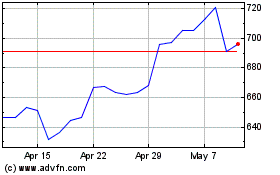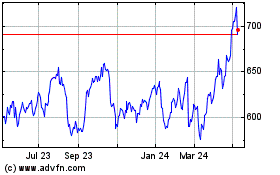U.S. Sanctions on Hong Kong Security Law Puts Banks in a Quandary
July 15 2020 - 11:37AM
Dow Jones News
By Frances Yoon and Quentin Webb
As the U.S. moves to punish Chinese officials involved in the
clampdown on Hong Kong, international banks and other businesses
have a problem: how to obey conflicting rules of both Washington's
coming sanctions regime and the territory's broad new
national-security law.
On Tuesday, President Trump signed into law a bill that requires
sanctions against not only Chinese officials and entities
materially contributing to the erosion of Hong Kong's autonomy, but
also financial institutions doing business with those who will
appear on the eventual blacklist.
At the same time Hong Kong's security law outlaws receiving
"instructions, control, funding or other kinds of support from a
foreign country" to impose sanctions against Hong Kong or
China.
The issue may come to a head swiftly: the U.S. Secretary of
State has 90 days to identify sanctions targets, and after that, a
30- to 60-day timetable kicks in for his counterpart at the
Treasury Department to name "foreign financial institutions" which
have conducted significant transactions with those people.
Mini vandePol, the Asia Pacific head of compliance and
investigations at law firm Baker McKenzie, said some banks were
already trying to identify likely sanctions targets and adapt
accordingly.
"The most important thing institutions can do at this time is to
have a thorough understanding of their business partners so that
they can address any potential risks proactively," she said.
However, she said she advised clients to focus more on the actual
risks posed by other, already existing sanctions programs.
Last week, the Trump administration imposed sanctions on senior
Chinese officials accused of carrying out human-rights abuses
against Turkic Muslims in the remote Xinjiang region. The sanctions
would ban travel to the U.S. and access to the U.S. financial
system. China vowed to impose retaliatory measures.
In a briefing dated July 13, lawyers from Norton Rose Fulbright
said the potential dilemma had "sparked considerable controversy
within the financial industry in Hong Kong."
"Companies may have to choose between breaching the national
security law and falling foul of U.S. sanctions. Several banks have
sought clarification in this regard, however guidance from Hong
Kong or Chinese authorities has not yet been received," they
wrote.
Almost all international banks have some presence in Hong Kong.
Some, including HSBC Holdings PLC, Standard Chartered PLC and
Citigroup Inc., have sizable retail networks. The three banks all
declined to comment.
The Norton Rose Fulbright team said some financial institutions
with significant operations in Hong Kong had already reviewed their
client base to identify potential sanctions targets. In addition,
they said that while political rhetoric suggested a focus on
Chinese state-owned banks, the Act's remit extended to insurers,
currency exchanges, travel agents and even car dealers.
Yuan Zheng, a lawyer for law firm Davis Polk, said Chinese
authorities might not enforce the national-security law provision
so aggressively that standard procedures like reviewing client
databases or reclassifying a client as higher-risk would count as a
breach. But she said freezing accounts or ending relationships
could draw more scrutiny.
For individuals, U.S. sanctions would include visa bans and
asset freezes. For financial institutions, the Washington's Hong
Kong Autonomy Act lists 10 possible punishments, including bans on
getting loans from U.S. banks, doing foreign-currency deals in the
U.S., and on their executives entering America. The president would
have to introduce five of these within a year, and all 10 within
two years.
Sanctions have long been a minefield for international banks,
and rising tensions between the U.S. and China have already created
other difficulties for some global lenders.
HSBC Holdings PLC was pilloried by pro-Beijing figures and the
state media for not getting behind the security law, and then faced
a backlash in the U.S. and U.K. after its Asia chief endorsed the
legislation.
The bank earlier had to respond to anger in Beijing over
information it provided in a U.S. criminal case against China's
Huawei Technologies Co., in a case tied to sanctions on Iran.
Write to Frances Yoon at frances.yoon@wsj.com and Quentin Webb
at quentin.webb@wsj.com
(END) Dow Jones Newswires
July 15, 2020 11:22 ET (15:22 GMT)
Copyright (c) 2020 Dow Jones & Company, Inc.
Hsbc (LSE:HSBA)
Historical Stock Chart
From Mar 2024 to Apr 2024

Hsbc (LSE:HSBA)
Historical Stock Chart
From Apr 2023 to Apr 2024
